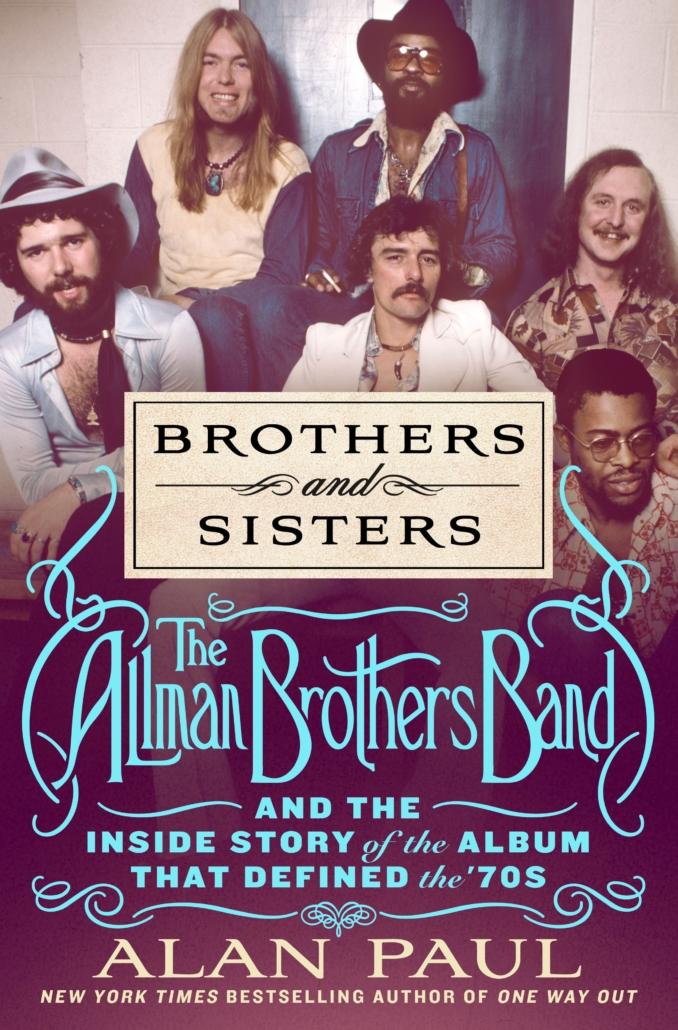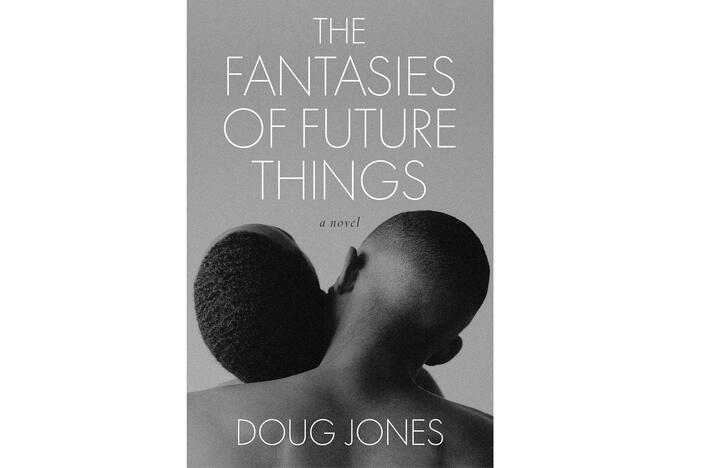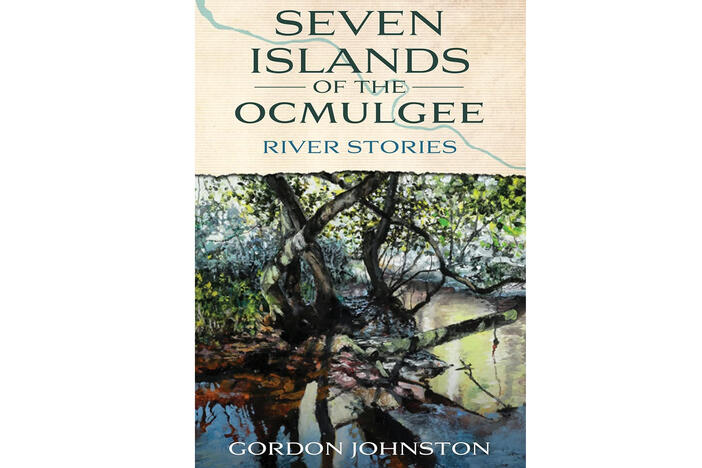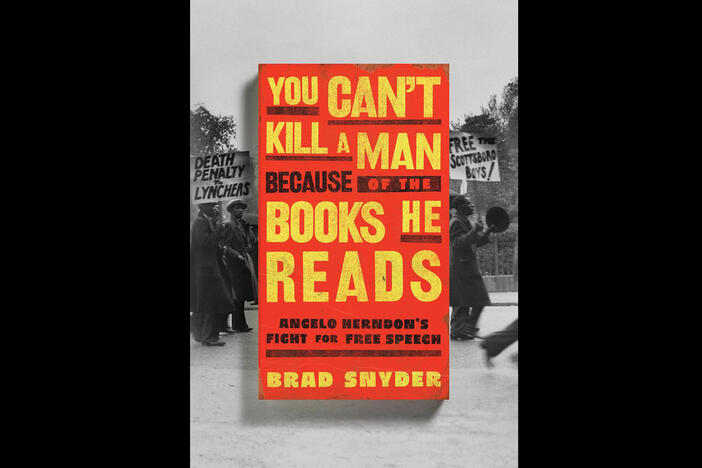
Section Branding
Header Content
Alan Paul's Brothers and Sisters: The Allman Brothers Band and the Inside Story of the Album That Defined the '70s
Primary Content
The Allman Brothers Band's "Brothers and Sisters" is iconic. In this episode, Peter and Orlando discuss Alan Paul's deep dive into the time before and after the 1973 album. It was not only the band’s best-selling album, at over seven million copies sold, but it was also a powerfully influential release, both musically and culturally. And this book has converted one of the hosts into a fan.

Orlando Montoya: Coming up in this episode.
Peter Biello: I know so little about this, Orlando. That's why I'm turning to you.
Orlando Montoya: There's two brothers, Duane and Gregg. And so they formed this band, and it — it became a sensation.
Alan Paul: Governor Carter says he's going to come down and visit the studio and they all expected him to come. They were very excited he was coming. They thought he'd be there for 10 minutes. They'd take a bunch of pictures and he'd leave. He spent hours there.
Orlando Montoya: Numerous incidents where, you know, they could have died. They almost died.
Peter Biello: This podcast from Georgia Public Broadcasting highlights books with Georgia connections, hosted by two of your favorite public radio book nerds, who also happen to be your hosts of All Things Considered on GPB Radio. I'm Peter Biello.
Orlando Montoya: And I'm Orlando Montoya. Thanks for joining us as we introduce you to authors, their writings, and the insights behind their stories mixed with our own thoughts and ideas on just what gives these works the Narrative Edge.
Peter Biello: Okay, Orlando, let's talk about books. What do you have today?
Orlando Montoya: Today I have the Allman Brothers Band. The book is called Brothers and Sisters: The Inside Story of the Album That Defined the Seventies by Alan Paul. Let me ask you this, how many songs by the Allman Brothers can you name?
Peter Biello: None. I'm so sorry to say that only because, like I know I could probably hear those hear a song by them and be like, "Oh, yeah, I know that song." But do I know it's the Allman Brothers? No. Do I know what it's titled? No.
Orlando Montoya: "Ramblin Man." There's one.
Peter Biello: Yes, of course I know "Ramblin Man!"
Orlando Montoya: So like you, I was not a super fan. I probably like you could only recognize, like, one song of theirs. But the book, this book gave me a real deep appreciation for their music.
Peter Biello: Really?
Orlando Montoya: I really love their music, their times, their — their perseverance, the challenges they faced. Because of this book, I am now a fan, and because of this book I want to visit Macon now. You know they're from Macon, right?
Peter Biello: I have heard that. Yes.
Orlando Montoya: Yes, they're from Macon. I want to go to the big house where they lived. And if a book can do that, I think it's pretty powerful.
Peter Biello: Okay. So — so what was powerful about this book in particular? How did the book turn you into a fan?
Orlando Montoya: Well, I think what we're looking for in books is like a connection, like we're looking for in life in general; we're looking for a connection. And so while this book professes to be about an album, this one album called Brothers and Sisters, this is this is one chapter in the band's career, right? So this this this album is only seven songs, 38 minutes long. So if it's just about this album, it's going to be a very short book. But what I like about this book is that it's really all about the band's life, focusing on this one chapter, but it really gives you an emotional connection to the people that were involved, not just the band members, but also their managers, their producers, their wives. And the connection, I think, comes through these tapes that I want to talk to you about.
Peter Biello: Tapes like not music tapes, but interview tapes.
Orlando Montoya: Interview tapes.
Peter Biello: Seems to be a theme with you. We talked about secret tapes a few episodes ago with Martin Luther King.
Orlando Montoya: Yes. So, I mean, these when you have tapes like this, it sort of brings you into their lives in a deeper way. And so, Alan Paul got access to a treasure trove of interviews with band members and others connected to the band. And these tapes, these quotes, these stories became the heart of a book that's really about a group of individuals, friends, bandmates, their professional challenges, their — their interpersonal relationships. So it's more than a story about an album. It's the story about people. And here's where I want to introduce Alan Paul.
Alan Paul: Yeah, so the tapes that you're talking about were interviews done by Kirk West, who's been one of my best friends for decades now, and he was the band's tour mystic. That's what they called him after they re-formed in 1989. And he had that title because he was the tour manager, but he did so much more. He was the archivest, the historian, the band photographer, and he was sort of my link from becoming like a regular journalist covering the band into more of an insider because of our relationship. He had done these interviews in 1986 and '87 when the band was broken up. To answer your question, what was going on? Nothing. They were broken up. They were each pursuing solo careers in various ways. They were sort of in hard times to various extent. Each member, of course, a little bit different. And they were sort of reflective of the time. It was only about 10-13 years after the period in question, and they were very wistful about what they had. They were reflective. They weren't sort of political about the way they talked about things because they were broken up. They were kinder to each other than they would sometimes would be in later years.
Orlando Montoya: So imagine, you know, time has gone on from challenges in your life, you know? As I know, you've you've had challenges.
Peter Biello: Oh, we all have. Yeah.
Orlando Montoya: But, you know, years later, you're you're looking back on them and maybe these hard times come back a little bit — little bit more, honestly.
Peter Biello: Yeah, I would say if I had to put myself in their position, maybe it's like the stress of the moment is gone and you can sort of look at the past through rose-colored glasses. Is that what they were doing in those tapes?
Orlando Montoya: Well, they're just being honest, you know, about their challenges, you know about some of their challenges. I hope, you know, Duane Allman died.
Peter Biello: I know so little about this, Orlando. That's why I'm turning to you.
Orlando Montoya: There's two brothers, Duane and Gregg. And so they formed this band and it — it became a sensation, a phenomenal sensation. But Duane died tragically in a motorcycle crash. And then another band member, Berry Oakley, died just a year later in another motorcycle crash. And so what do you do as a band now? You know, how do you bring new band members into the band? How does that affect the dynamics of writing, touring, making business decisions, living together? These guys lived together.
Peter Biello: Is the music different after that? Are you grieving through the art?
Orlando Montoya: That's what they're going into in this book. And in addition to all of that, they had financial problems, they had bad management. Management that was taking advantage of them. There was disagreements over business decisions. And, you know, I've never had a close family like this. You know, I've never had a close group of friends like this ever. It's not a dynamic that I've lived and so being dropped into this band dynamic, this family dynamic for a week or two that it took me to listen to this book — as I did in audiobook — it was very intoxicating for me. It gave me a sense of, again, connection.
Peter Biello: So were the tapes featured in the audiobook?
Orlando Montoya: Yes, they were.
Peter Biello:Oh, that's cool.
Orlando Montoya: And that's one reason I you know, I don't admit a lot to reading audiobooks, but I do.
Peter Biello: Why? What's the shame in that?
Orlando Montoya: I like listening to audiobooks. But this one I'll plug in particular because the author, Alan Paul, is the narrator of the audiobook, and they bring in these tapes. You can hear from Gregg himself and Chuck Leavell and the other band members, which is a plus, in my opinion.
Peter Biello: Hmm. Okay. And are there any — you know, this is a rock book. So are there sex, drugs and rock and roll stories here?
Orlando Montoya: There's lots of those stories. They were one of the biggest rock bands of their era. It was a pretty free era in terms of those vices. Do I want to share any?
Peter Biello: I, I was hoping you would have a clip from from Paul there. No?
Orlando Montoya: No. I don't want to dwell on that aspect. But I will say one of my favorite quotes from the book, they were talking about a legendary concert that they performed with The Grateful Dead and the band that was known as The Band, the one with Robbie Robertson. And during that performance, I think the quote I can't remember who said it, but it was something like "The Band were all drunk, The Dead were on acid and the Allman Brothers were were on coke," which, given the music, sounds about right.
Peter Biello: All right. So you were new to the Allman Brothers before the book. Was there anything that surprised you about them in the book?
Orlando Montoya: I'll highlight a few things. One was how big the band was. Again, I didn't grow up in that time. But this band was huge. They played a gig in Watkins Glen, New York for 600,000 people. And in that chapter, Paul goes into the scene, the audio setup, the helicopters that were involved. This was like a second Woodstock that took place.
Peter Biello: For just the Allman Brothers.
Orlando Montoya: Allman Brothers and The Dead and The Band.
Peter Biello: Okay.
Orlando Montoya: So it was a it was a super huge concert. No. 2, their connection with Jimmy Carter, more so about how much Jimmy Carter liked jazz and rock and roll and Bob Dylan. I think another funny story in the book relates to Jimmy Carter quoting Bob Dylan at a business speech, in a business political speech context. You know how risky it was for Carter to be associated with these bands. The Allman Brothers, as you know, as I just mentioned, they had a — they had drug problems, numerous incidents where, you know, they could have died. They almost died. And there were — there was bad publicity around them at one point. And here's Alan Paul talking about Carter and the band.
Alan Paul: He put his money where his mouth is. It was a relationship of convenience to some extent, because they helped each other. But it was much more than that on both sides, I think that's fair to say. And, you know, perfect example, in 1974 when they were just developing this relationship, Dickey Betts of the Allman Brothers is recording his solo album. And Gov. Carter says he's going to come down and visit the studio and they all expected him to come. They were very excited he was coming. They thought he'd be there for 10 minutes. They'd take a bunch of pictures and he'd leave. He spent hours there. There's photos of him. I have one in the book where he has headphones on and he's sitting in the control room. Rosalynn is standing behind him. I mean, he really was into it. He, he wasn't just popping in there to take a picture and glad-hand. And I think that sums it up really well. So, of course, he was taking advantage of this relationship and this friendship, to get attention, to get money to raise his profile on the national stage, but in a very genuine way, the same way that any of us might, if we were needed help. We turn to our friends. And that's something else that Gregg said in that interview with Kirk that we talked about. Gregg said when he first met Jimmy Carter, they were sitting there, they were having scotch in the governor's mansion at 2 in the morning or something and listening to Elmore James blues records, which Gregg thought was just unbelievable. My God, you know, this is a guy who's never been accepted into the mainstream at that point in this way. He's sitting in his governor's mansion drinking scotch, listening to blues. And Carter says to him, "You know, I think I'm going to run for president and I might need your help." And Gregg said that he thought to himself, this guy has no chance of being president. "But sure," you know, he said, "of course I'll help you." And he said, "Listen, it was a friendship thing. If he had told me he needed some money to raise to open used car lots, I probably would have lent it to him. I mean, I wanted to support him because I liked him."
Orlando Montoya: I mean, that just makes Carter even more cool, in my opinion.
Peter Biello: That's the one Allman Brothers fact, I think I did know. But that's just through my reading about Jimmy Carter is that the Allman Brothers once stepped in and raised a bunch of money for him.
Orlando Montoya: Yeah, well, there was a whole documentary, I think it was called Jimmy Carter: Rock and Roll President.
Peter Biello: Well, there you go.
Orlando Montoya: But, you know, after Carter won the Democratic nomination for president and Gregg Allman winds up on all these magazine covers with, you know, bad publicity, Carter does not throw him under the bus. And showing again what kind of man Carter was.
Peter Biello: Anything else that surprised you about the band?
Orlando Montoya: Yes. And this next one I absolutely did not see coming. And that's the band's connection to the 2000 Cameron Crowe film, Almost Famous. Turns out that that movie, a cult classic and Oscar-winning screenplay, an early film hit for Kate Hudson and Jimmy Fallon, would not have happened without the Allman Brothers.
Peter Biello: What was their role?
Orlando Montoya: So the movie is a semi-autobiographical story about a young journalist — in real life, Cameron Crowe — who when he was 15 years old, gets a cover story in the Rolling Stone by going on this wild tour with a band which in real life is the Allman Brothers. But young Crowe almost doesn't get the story in the magazine. It's just a wild adventure. It's a super movie. I watched it after reading this book, and it all came down to one night in a hotel with Cameron Crowe and Gregg Allman.
Alan Paul: You know, Cameron said to me, "if somebody had stepped from the future into the hotel that night, walked into the elevator, tapped me on the shoulder and said, 'this night will change your life and you'll be talking about it for 50 years,' I would have believed him," because even in that moment, although obviously he didn't know what was going to come out of that, he knew that it was a momentous time in his life and he wrote the story and it launched his career.
Orlando Montoya: Great movie. Great book. Great album. And I didn't even hear anything else but "Ramblin Man" until I read this book.
Peter Biello: And now you know, a whole lot more.
Orlando Montoya: Now I know a whole lot more.
Peter Biello: You could name a bunch more songs.
Orlando Montoya: I can name a bunch more songs. "Melissa." There was a great bunch of ones on that album.
Peter Biello: Well, the book about the Allman Brothers is called Brothers and Sisters: The Inside Story of the Album that Defined the Seventies by Alan Paul. Orlando, thanks for telling me about it.
Orlando Montoya: All right. Thank you.
Thanks for listening to Narrative Edge. We'll be back in two weeks with a brand-new episode. This podcast is a production of Georgia Public Broadcasting. Find us online at GPB.org/NarrativeEdge.
Peter Biello: You can also catch us on the daily GPB News podcast Georgia Today for a concise update on the latest news in Georgia. For more on that and all of our podcasts, go to GPB.org/Podcasts.
The Allman Brothers Band's Brothers and Sisters is iconic. In this episode, Peter and Orlando discuss Alan Paul's deep dive into the time before and after 1973’s Brothers and Sisters. It was not only the band’s best-selling album, at over seven million copies sold, but it was also a powerfully influential release, both musically and culturally. And this book has converted one of the hosts into a fan.







